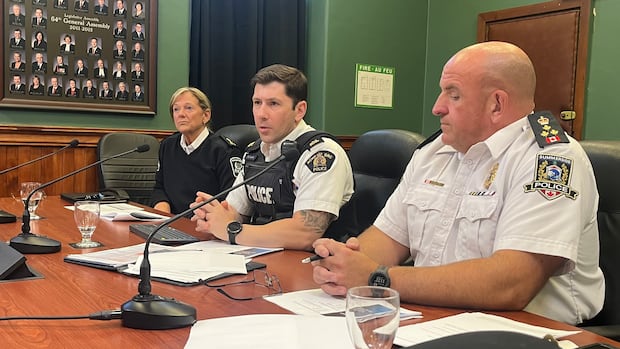PEI·NewP.E.I.’s top police officials are urging caution as the province considers whether to adopt an immediate roadside prohibition (IRP) program for impaired driving, which would allow police to issue licence suspensions and penalties directly at the roadside without a court process. Law enforcement officials say what works in larger provinces may not suit the IslandThinh Nguyen · CBC News · Posted: Oct 15, 2025 4:02 PM EDT | Last Updated: 7 minutes agoUnder the immediate roadside prohibition (IRP) model, drivers face immediate consequences based on their blood alcohol concentration (BAC), including licence suspension, vehicle impoundment, fines and mandatory education programs. (Travis Kingdon/CBC)Prince Edward Island’s top police officials are urging caution as the province considers whether to adopt an immediate roadside prohibition (IRP) program for impaired driving.The system, already used in several larger provinces, allows police to issue licence suspensions and penalties directly at the roadside without a court process.Representatives from the Island’s three main police services — Chief Superintendent Kevin Lewis of the P.E.I. RCMP, Acting Chief Jennifer McCarron of Charlottetown Police Services, and Chief Jason Blacquiere of Summerside Police Services — presented to MLAs during a legislative standing committee meeting on Wednesday.Lewis told the committee the IRP approach was developed for big cities where police deal with high traffic volumes and frequent impaired-driving stops.“The IRP was intended for big cities… where you have a high volume of traffic, where you have just people out and about, stopping cars and doing impaired check, stops, those types of things, because you have volumes of people,” Lewis told MLAs.“So in Surrey, B.C. it would be much easier, right?… Not so much in Souris, P.E.I.”WATCH | Police urge caution on adopting immediate licence suspensions for impaired drivers on P.E.I.:Police urge caution on adopting immediate licence suspensions for impaired drivers on P.E.I.Three of P.E.I.’s top police officers are urging caution as the provincial government considers adopting a new program to catch impaired drivers, saying it may not be the best way to tackle the problem. But others say the program works. CBC’s Wayne Thibodeau reports.Lewis said P.E.I.’s current legislation is already “robust.” The province has some of the strictest impaired driving laws in Canada and is the only jurisdiction where jail time is typically ordered for a first conviction.But he said one of the biggest concerns with implementing an IRP system is that it could give the impression of “decriminalizing” impaired driving.“We have some of the largest rates of impaired driving per capita here on P.E.I. so would it be a good idea to go along with an administrative penalty? I don’t think really that’s the best opportunity for us… to combat impaired driving, as our judges here are giving stiff penalties for impaired drivers, and that doesn’t seem to be deterring things,” he told CBC News after the meeting.“So I don’t believe that a financially-based penalty system is going to be the answer to solving impaired driving here.”IRP proven to save lives, MADD saysSteve Sullivan, CEO of MADD Canada, said evidence from other jurisdictions like British Columbia shows the IRP system reduces deaths and injuries caused by impaired driving.After watching Wednesday’s standing committee meeting, Sullivan said it appeared police on P.E.I. were concerned about the program’s deterrent effect.But he said the perception of being caught is often more powerful than the severity of penalties.“If people believe when they go out on the road, there’s a better chance they’re going to get caught today than yesterday, that’s going to change their behaviour. And an IRP system means police will catch more drivers,” he said.Steve Sullivan, CEO of MADD Canada, said evidence from other jurisdictions shows the IRP system reduces deaths and injuries caused by impaired driving. (Zoom)“To me, from a law enforcement perspective, that’s what you ultimately want to do, is get as many [impaired] drivers off the road,” Sullivan said. “You know, what happens to them is important, but getting them off the road, because every single one of them is a potential killer.”As for concerns that an IRP system might give the impression of decriminalizing impaired driving, Sullivan said serious cases, such as those involving children, injuries, deaths or repeat offences, would still be prosecuted under the Criminal Code.System already in place in other provincesThe system is already in place in British Columbia, Alberta, Manitoba, and most recently, New Brunswick.Under the IRP model, drivers face immediate consequences based on their blood alcohol concentration (BAC), including licence suspension, vehicle impoundment, fines and mandatory education programs. The penalties vary depending on whether the driver is in the “warn” range (0.05–0.079 BAC) or the “fail” range (0.08 and above), with more severe penalties for higher levels.The system is designed to quickly remove impaired drivers from the road, act as a deterrent and reduce the time police spend processing impaired driving cases.Lewis noted the IRP applies only to first-time offenders. Repeat offenders would still face criminal charges under the federal Criminal Code.More education needed, police sayDuring the meeting, Lewis shared statistics showing that from 2019 to now, there have been 77 fatal collisions resulting in 90 deaths in RCMP jurisdictions on P.E.I. — with 25 of those collisions involving drugs or alcohol.The majority of offenders are male, with the highest rates among those aged 25 to 39. Impaired driving remains especially prominent in rural areas. According to Chief Superintendent Kevin Lewis of the P.E.I. RCMP, since 2019 to the present, there have been 77 fatal collisions resulting in 90 deaths in RCMP jurisdictions on P.E.I. — with 25 of those collisions involving drugs or alcohol. (Wayne Thibodeau/CBC)“I think that at this point in time, with the state of impaired driving in P.E.I., that we need to do more for education on the Island for impaired driving, especially with youth and new drivers, and I think reducing the penalties and going with an administrative system is not the answer,” Lewis said.”It really gives the impression that we’re softening the impacts of impaired driving.”Another concern, he added, is that the IRP model only applies to alcohol-related offences, while drug-impaired driving has also become an issue on the Island.“Forty-five per cent of impaired driving seems to be drug impaired nowadays. So we’re seeing that shift away from alcohol, but it’s being replaced with drugs,” he said.Committee chair and PC MLA Susie Dillon (centre) speaks with Acting Chief Jennifer McCarron of Charlottetown Police Services (left) and Summerside Police Services Chief Jason Blacquiere about the impact an IRP system could have on P.E.I. (Wayne Thibodeau/CBC)In a statement, a spokesperson with the province said the Department of Justice and Public Safety and the Department of Transportation are “continually exploring many different mechanisms, including changes to the existing roadside penalty system to further strengthen deterrence for impaired driving.” But, it goes on to say that the outcomes of a change to additional roadside penalties “would have a direct impact on the safety of P.E.I. drivers” and so, it’s “imperative that time is taken for legislative and jurisdictional research to be completed.” Earlier this year, the province completed public engagement for a new 10-year highway safety plan aimed at reducing dangerous driving, the statement said. That report should be available later this year. With files from Wayne Thibodeau
Police urge caution on adopting immediate licence suspensions for impaired drivers on P.E.I.











